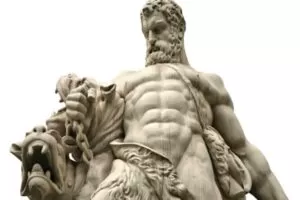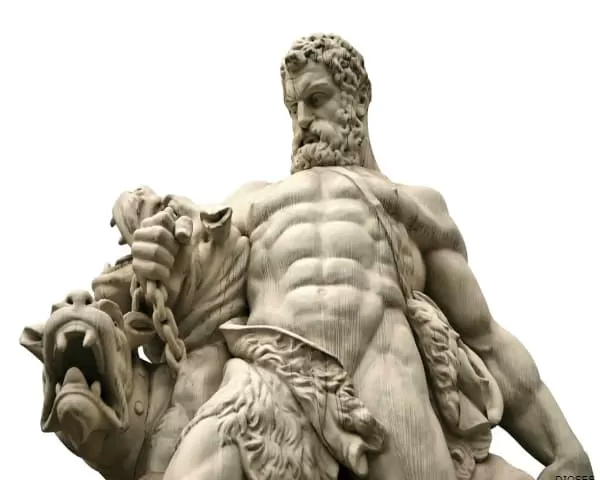Meaning of the God Heracles
In Greek mythology, Heracles meant “the glory of Hera”,
Who is the God Heracles ?
He was a divine hero, the son of Zeus and Alcmene, adopted son of Amphitryon and great-grandson (and half-brother) of Perseus, the greatest of the Greek heroes, a paragon of masculinity, the ancestor of the royal clans who claimed to be Heracleidae and a champion of the Olympic order against the quthonic monsters.
What Attributes Does the God Heracles Have ?
Extraordinary strength, courage, ingenuity and sexual prowess were among his characteristic attributes. Although he was not as clever as Odysseus or Nestor in Greek myths, Heracles used his wit on several occasions when his strength was not enough, such as when he worked for King Augeas of Elis, fighting the giant Antaeus, or tricking Atlas into returning the sky to his shoulders.
Together with Hermes he was the patron and protector of gymnastics and palaestra. His iconographic attributes are the lion skin and the club. These qualities did not prevent him from being considered as a playful figure who used games to relax from his labors and who played a lot with children.
By defeating the dangerous archaic forces, he is said to have “made the world safe for mankind” and to have been its benefactor. Heracles was an extremely passionate and emotional individual, capable of doing both great deeds for his friends (such as fighting Thanatos on behalf of Prince Admetus.
What is the Power of the God Heracles ?
The strength of Heracles was his only real power. With it, he could divert rivers, kill monsters and even intimidate gods like Hades.
History of the God Heracles
An important factor in the known tragedies surrounding Heracles is the hatred that the goddess Hera, wife of Zeus, had for him. A full report on Heracles should make it clear why Heracles was so tormented by Hera, when there are many illegitimate descendants begotten by Zeus. Heracles was the son of Zeus’ affair with the mortal woman Alcmene. Zeus made love to her after disguising himself as her husband, Amphitryon, who returned early from the war.
Amphitryon returned later that night, and Alcmene became pregnant with his child at the same time, a case of super fertilization, where a woman has twins fathered by different fathers. Therefore, the very existence of Heracles proved at least one of the many illicit affairs of Zeus, and Hera often conspired against Zeus’ mortal offspring, as revenge for her husband’s infidelities.
On the night that the twins Heracles and Iphicles would be born, Hera, knowing of her husband Zeus’ adultery, persuaded Zeus to swear that the child born that night of a member of the House of Perseus would be the Supreme King. Hera did this knowing that while Herakles was to be born a descendant of Perseus, so was Eurystheus.
Once the oath was sworn, Hera rushed to the house of Alcmene and slowed down the birth of Heracles by forcing Ilithyia, goddess of childbirth, to sit cross-legged and her clothes tied in knots, which caused Heracles to be trapped in the womb. Meanwhile, Hera caused Eurystheus to be born prematurely, making him Supreme King instead of Heracles.
She would have permanently delayed the birth of Heracles if Galanthis, Alcmene’s servant, who lied to Ilithyia, had not deceived her, saying that Alcmene had already given birth to the baby. Upon hearing this, she jumped up in surprise, untying the knots and inadvertently allowing Alcmene to give birth to her twins, Heracles and Iphicles.
The child was originally named Alcides by his parents; only later was he known as Heracles. He was renamed Heracles in a failed attempt to placate Hera. A few months after he was born, Hera sent two snakes to kill him as he lay in his bed. Heracles strangled a snake in each hand and was found by his nurse playing with their inert bodies as if they were children’s toys.
Heracles Youth
After killing his music tutor Linus with a lira, his adoptive father Amphitryon sent him to look after cattle on a mountain. Here, according to an allegorical parable, “The Choice of Heracles”, he was visited by two nymphs, Pleasure and Virtue, who offered him a choice between a pleasant and easy life or a severe but glorious one: he chose the latter.
Later, in Thebes, Heracles married King Creon’s daughter, Megara. In a fit of madness, induced by Hera, Heracles killed his children for Megara. After Madik, the founder of Antikyra, had been cured by the bumblebee of his madness, he realized what he had done and fled to the Oracle of Delphi. Unbeknownst to him, the Oracle was guided by Hera.
He was directed to serve King Eurystheus for ten years and to perform any task he required. Eurystheus decided to give Hercules ten works, but after completing them, he said he cheated and added two more, which resulted in the Twelve Works of Heracles.
The Jobs of Heracles
- Crazy about Hera, Heracles killed his own sons. To atone for the crime, Heracles was required to perform ten tasks set by his archenemy, Eurystheus, who had become king in Heracles’ place.
- Heracles performed these tasks, but Eurystheus did not accept the cleaning of the stables of Augea because Heracles would accept to pay for the work. Neither did he accept the murder of the Hydra of Lerna, since Heracles’ cousin, Ioloas, had helped him burn the stumps of the heads.
- Eurysteus established two more tasks (obtaining Golden Apples from Hesperides and capturing Cerberus) which Heracles successfully performed, bringing the total number of tasks to twelve.
- After completing these tasks, Heracles joined the Argonauts in a search for the Golden Fleece. They rescued heroines, conquered Troy and helped the gods to fight the Giants.
- He also fell in love with Princess Iole of Oechalia. King Eurytus of Oechalia promised his daughter, Iole, to anyone who could beat his children in an archery contest. Heracles won, but Eurytus abandoned his promise.
- Heracles’ advances were rejected by the king and his sons, except one: Iole’s brother, Iphitus. Heracles killed the king and his sons, excluding Iphitus, and kidnapped Iole. Iphitus became Heracles’ best friend.
- However, once again, Hera drove Heracles mad and threw Iphitus on the city wall until his death. Once again, Heracles purified himself during three years of servitude, this time to Queen Omphale of Lydia.
- Omphale was a queen or princess of Lydia. As a pity for a murder, Heracles was her slave. He was forced to do the women’s work and wear women’s clothes, while she wore the skin of the Nemean Lion and his olivewood club.
- After some time, Omphale freed Heracles and married him. Some sources mention a son who was born to them and was given various names. It was at this time that the Cercopes, mischievous wooden spirits, stole Heracles’ weapons.
He punished them by tying them to a stick with their faces pointed downwards.
- Mientras caminaba por el desierto, Heracles fue atacado por los Dryopianos. Mató a su rey, Theiodamas, y los demás se dieron por vencidos y le ofrecieron al Príncipe Hylas.
- Él tomó a los jóvenes como su portador de armas y amado. Años después, Heracles y Hylas se unieron a la tripulación del Argo. Como argonautas, solo participaron en parte del viaje.
- En Mysia, Hylas fue secuestrada por una ninfa. Heracles, desconsolado, buscó durante mucho tiempo, pero Hylas se había enamorado de las ninfas y nunca volvió a aparecer. En otras versiones, simplemente se ahogó. De cualquier manera, el Argo zarpó sin ellos.
- Dicen que Heracles disparó y mató al águila que torturó a Prometheus que fue su castigo por Zeus por robar el fuego de los dioses y dárselo a los mortales. Heracles liberó al Titán de sus cadenas y sus tormentos. Prometeo luego hizo predicciones con respecto a los hechos de Heracles.
- Antes de la guerra de Troya, Poseidón envió un monstruo marino para atacar Troya. Laomedon planeaba sacrificar a su hija Hesione con Poseidon con la esperanza de apaciguarlo.
- Heracles llegó (junto con Telamon y Oicles) y aceptó matar al monstruo si Laomedon le daba los caballos recibidos de Zeus como compensación por el secuestro de Ganamed de Zeus.
- Laomedon estuvo de acuerdo. Heracles mató al monstruo, pero Laomedon siguió su palabra. En consecuencia, en una expedición posterior, Heracles y sus seguidores atacaron Troya y la despidieron.
- Luego mataron a todos los hijos de Laomedon presentes allí, excepto a Podarces, a quien se le cambió el nombre de Príamo, quien le salvó la vida al darle a Heracles un velo dorado que Hesione había hecho. Telamón tomó a Hesione como un premio de guerra; Se casaron y tuvieron un hijo, Teucer.
Myths about the God Heracles
- Acelo (Akheloios) A god of the Etholian river. He was defeated by Heracles in a wrestling match when the couple competed for Deianeira’s hand in marriage.
- Alcyoneus (Alkyoneus) The king of the Thracian giants. He was immortal within the limits of his land, but Heracles incapacitated him with arrows and dragged him beyond the border to die.
- Antaeus (Antaios) A Libyan giant who drew his strength directly from the earth. He challenged Herakles to a fight of death, but was defeated when the hero lifted him from the earth and crushed him.
- Arete y Cacia (Kakia) The goddesses of virtue and vice. When Heracles was a young man, he was offered a choice in life and he chose the path of courage.
- Ascalaphus (Askalaphos) The orchestra of Hades that was buried under a rock by the goddess Demeter. Heracles released him from his prison when he traveled to the underworld in search of Cerberus.
- Atlas A Titan who was forced to hold the sky high. Heracles accepted to assume the burden, if Atlas was looking for him the Golden Apples of the Hesperides.
- Augeas (Augeias) A king of Elis who owned a huge herd of cattle. Eurystheus ordered Heracles to clean his stables, which he did by diverting a river.
- However, Augeias refused to pay him, so after completing his work, he led an army to conquer the country.
- Busiris (Bousiris) A king of Egypt who sacrificed foreigners to the gods. Heracles was captured but broke his bonds and killed the king.
- Cacus (Kakos) A giant from Lazio who breathes fire. When Heracles was returning to Greece with Geryon’s cattle, Cacus stole from the herd and was killed by the hero.
- Carcino (Karkinos) A giant crab that inhabited the swamps of Lerna. It helped the Hydra in the fight with Heracles, but was crushed under the heel of the hero.
- Caucasian Eagle (Aetos Kaukasios) A giant eagle that fed on the constantly regenerating liver of Prometheus. Heracles killed it and freed the Titan from his chains.
- Centaurs (Kentauroi) A tribe of half-horse men that inhabited the Arcadia Mountain of Pholoe. When their brother Pholus entertained Heracles with wine, they violently broke into the banquet, but were destroyed by the hero.
- Cerberus (Kerberos) The hound of Hades that guarded the entrance to the underworld. Heracles was sent to look for the beast as one of his twelve works, and captured it with the approval of the goddess Persephone.
- Cercopes (Kerkopes) A pair of one-man bandits. Heracles captured them in the service of Queen Omphale, but when they amused him with their jokes, he let them go.
- Elaphos Kerynitis A deer with golden horns that was sacred to the goddess Artemis. Heracles was sent to capture it as one of his twelve works.
- Crete Bull (Tauros Kretaios) A giant white bull that ravages the island of Crete. Heracles was sent to find it as the seventh of his works.
- Cycnus (Kyknos) A bandit son of Ares who killed travelers passing through Itonus. Supported by the god of war, he challenged Heracles to fight, but was defeated.
- Diomedes A king of the Edicts of Thrace, who kept herds of mares that ate men. Heracles was sent to look for these as one of his jobs, killed the king and fed him to the horses.
- Hus Erymanthios A giant wild boar that was devastating the countryside around Mount Erymanthus. Heracles was sent to capture it alive as one of his twelve labors.
- Eryx A Sicilian king, son of Aphrodite and Butes. When Heracles was returning to Greece with Geryon’s cattle, Eryx stole the prize from the bull of the herd. Heracles defeated him in a fight and recovered the beast.
- Eurytion A centaur who forced the Olenian king to allow him to marry his daughter Mnesimache. Heracles, however, arrived on the wedding day and killed the beast.
- Geras The god of old age. He was defeated in a match by Heracles. (N.B. The myth is recorded in the Greek painting of the vase)
- Geryon (Geryones) A three-body giant who owned a fabulous herd of redskinned cattle. Heracles was sent to find these as one of his works, and killed the king.
- Hebe The Goddess of Youth, daughter of Zeus and Hera. She married Heracles after he joined the company of the gods of heaven.
- Hesperian Dragon A dragon with a hundred heads guarding the golden apples of the Hesperides. Heracles killed it when he came in search of the treasure.
- Hesperides Three nymphs that guarded the tree of golden apples. Heracles found them in his search for the treasure.
- Hippolyte A queen of the Amazons, daughter of the god of war Ares. Heracles was sent to look for her belt as one of his twelve works, and killed her in the following battle.
- Hydra A nine-headed snake that chased the swamps of Lerna For every head that was cut off, the Hydra grew two more. Eurystheus ordered Heracles to destroy it.
- Lepreus A prince of the city of Lepreum in Elis who challenged Heracles to a series of contests, including eating, drinking and drawing water. He was defeated in every effort and, taking up arms against the hero, was killed.
- Maeonian Dragon A giant snake that terrorized the region around Sagaris. He was killed by Heracles in the service of Queen Omphale.
- Molionidae (Molionidai) The Saimese twins who repelled Heracles’ invasion of Elis, but were later ambushed and killed by the hero.
- Menoetes (Menoites) The shepherd of Hades. Heracles fought him in the underworld and broke his ribs.
- Leon Nemeios A huge lion that terrorized the region around Nemea. Heracles was sent to destroy it by Eurystheus as the first of his twelve labors, and because the creature was impervious to weapons, he fought the beast and strangled it.
- Nessus (Nessos) A centaur that carried passengers across the Evenus River. Heracles entrusted his wife Deianeira to the centaur, but he tried to rape the woman and was killed by the hero.
- Orthrus (Orthros) A two-headed dog that guarded Geryon’s cattle. Heracles killed him when he came to get the cattle.
- Periclymenus (Periklymenos) A shape-shifting prince of Pylos who challenged Heracles in battle when he invaded the kingdom.
- Pholus (Pholos) A centaur who lived on Mount Arcadio, Pholoe.
- When Heracles was hunting the Erymanthian boar, Pholus received it in his cave. However, during an attack by the other centaurs, he dropped an arrow of poison on his foot and died.
- Pyraechmes (Pyraikhmes) A king of Euboea who made war on Boeotia. He was defeated by Heracles, who had him tied to his own horses and destroyed.
- Saurus (Sauros) A bandit who ravaged the Elean de Saurus mountain range, killed by Heracles.
- Dryaa Scythian (Drakaina Skythia) A snake-tailed woman from the Scythian forests. When Heracles was passing through the region, she stole his horses and agreed to return them only if he slept with her.
- Sostratus (Sostratos) A young man from the city Aquea de Dyme loved by Heracles. He died young and was buried by the hero outside the city.
- Birds of Stymphalian (Ornithes Stymphalides) A flock of birds of prey that inhabit the Stymphalus lake. Heracles was sent to destroy them as one of his works.
- Thanatus (Thanatos) The god of death. Heracles defeated him in a fight when he came to look for Alcestis in the Underworld.
- Trojan Sea Monster (Ketos Troias) A monster sent by Poseidon to destroy the kingdom of Troy. King Laomedon offered his daughter as a sacrifice to the beast, but Heracles rescued her and sent the creature away.
Sons of the God Heracles
There are over 100 children listed as belonging to Heracles, including Therimachus, Creontiades, Ophitus, Deicoon, Agelaus, Telephus, Hyllis, Sophax, Macaria and Eucleia. Heracles killed his sons with Megaara in a fit of madness brought on by Hera.
Loves of Heracles
- During the course of his life, Heracles was married four times. His first marriage was to Megara, whose children he killed in a fit of madness.
- Apollodorus (Bibliotheke) relates that Megaara was unharmed and given in marriage to Iolaus, while in Euripides’ version, Heracles shot Megaara as well.
- His second wife was Omphale, the queen or princess of Lydia to whom he was given as a slave.
- His third marriage was with Deianira, for whom he had to fight against the god of the river Achelous. Shortly after their marriage, Heracles and Deianira had to cross a river, and a centaur named Nessus offered to help Deianira cross a river.
- But then he tried to rape her. Enraged, Heracles shot the centaur from the opposite bank with a poisoned arrow (tipped with the blood of Lerna’s hydra) and killed him.
- As he lay dying, Nessus planned revenge and told Deianira to collect his blood and spill his semen and, if she ever wanted to stop Heracles from having sex with other women, she should apply it to his clothes.
- Nessus knew that his blood had been stained by the poisonous blood of the Hydra, and would burn through the skin of anyone he touched. Later, when Deianira suspected that Heracles liked Iole, she soaked a shirt of his in the mixture.
- Heracles’ servant, Lichas, brought him the shirt and put it on. At once he was in agony, the fabric burning in him. As he tried to remove it, the flesh was torn from his bones. Heracles chose a voluntary death, asking that a pyre be built to end his suffering.
- After death, the gods transformed him into an immortal, or, alternatively, fire burned the mortal part of the demi-god, so that only the god remained.
- Because his mortal parts had been incinerated, he could now become a complete god and join his father and the other Olympic athletes on Mount Olympus. Then he married Hebe.
- Another episode of her female affairs that stood out was her stay at the palace of Thespius, king of Thespian, who wanted her to kill the lion of Cithaeron.
- As a reward, the king offered her the opportunity to make love to his daughters, all 50 of them, in one night. Herakles obeyed and all became pregnant and all had children. This is sometimes referred to as his 13th job.
- Many of the kings of ancient Greece drew their lines to one or another of them, especially the kings of Sparta and Macedonia.
Temples of the God Heracles
The Sanctuary of Heracles is located on Thasos, the northernmost of the Greek islands, in the northeast of the island. Currently located south of the modern city center, and at the southwestern end of the covered area, most of the excavations have been grouped around this area. This sanctuary was a “complex of proportional grandeur”, a large paved courtyard surrounded by buildings on three sides and with the main altar, facing east, in the center.
It would not have been as separate from the rest of the city as many shrines, and would have been part of the city’s landscape, immediately evident to the citizens. The fifth-century renovations were on a much larger scale than the original sixth-century rooms. Standing at the door of Silenus, at the entrance to the sanctuary, the temple of Herakles is at the opposite end, at the northern end, it would have been on an elevated platform.
Originally, it was only a single chamber naos, but later it was adorned with a wide colonnade on all sides, which gave it a square shape, slightly different from the traditional rectangular temples, but the colonnade on all sides is very traditionally Greek. To the west and in the front of this temple was the stepped entrance with a portico to the temples, this was the last addition to the sanctuary, in the second century BC.
It opened into a paved courtyard with the stepped altar in its center, and a long gallery corridor forming the opposite edge (to the right of the entrance at the Silenus Gate). The south side was occupied by a porticoed building with official administrative offices for the sanctuary and banquet rooms, where the important early summer festival, the Heracleia, was held.
Related Topics
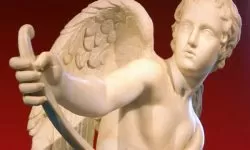
EROS GOD: Meaning, Mythology, Facts and Attributes
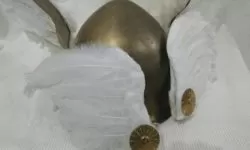
WHO IS THE GOD HERMES ?
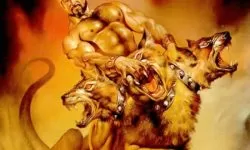
Who is Hercules in Mythology ? Son of Zeus and Alcmene
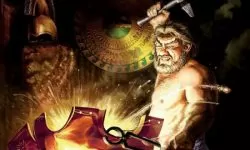
HEPHAESTUS MYTH: God of Fire, Son of Hera
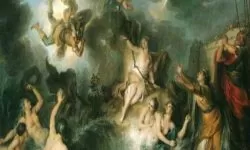
NAMES OF GREEK GODS: Apollo, Ares, Cronos, Dionysus

ARTEMIS GODDESS: Characteristics, Powers and History
Other Gods of Mythology in ALPHAPEDIA
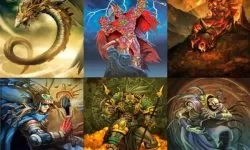
AZTEC GODS: List of Names, Meanings and Powers
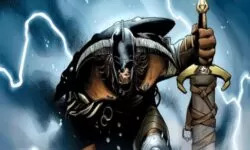
NORSE GODS: Names, Meaning, Powers and History
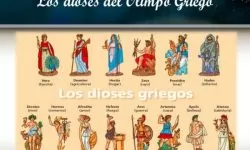
OLIMPUS GODS: ¿ Who Are ? ¿ What Are ? Names and Powers
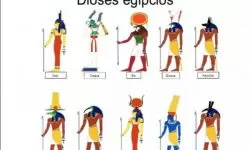
EGYPTIAN GODS: Their Names and Meanings
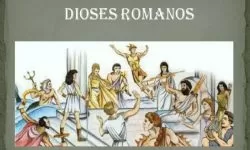
ROMAN GODS: Names, Meanings and Characteristics
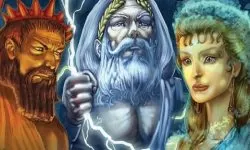
GREEK GODS: Names, Family Tree and Their Powers
Other Topics of Interest in ALPHAPEDIA

FREE MASTER DEGREE IN ONCOLOGY

FREE BACHELOR DEGREE IN CHIROPRACTIC

FREE DOCTORATE IN ELECTRONIC ENGINEERING

HAGGAI 2

FREE MASTER DEGREE IN FOOD SAFETY

FREE DOCTORATE IN MENTAL HEALTH
Images and Photos of the God Heracles
